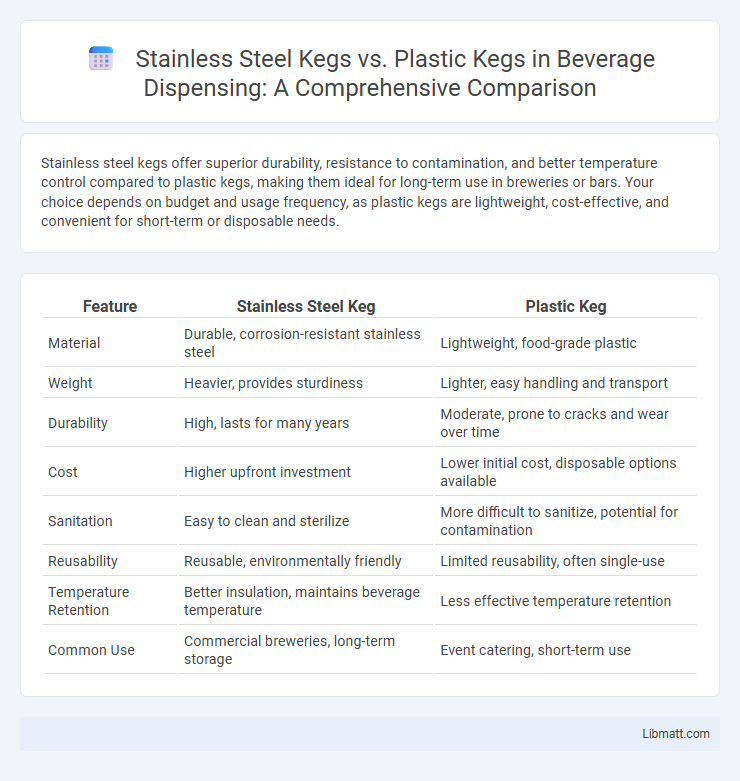Stainless steel kegs offer superior durability, resistance to contamination, and better temperature control compared to plastic kegs, making them ideal for long-term use in breweries or bars. Your choice depends on budget and usage frequency, as plastic kegs are lightweight, cost-effective, and convenient for short-term or disposable needs.
Table of Comparison
| Feature | Stainless Steel Keg | Plastic Keg |
|---|---|---|
| Material | Durable, corrosion-resistant stainless steel | Lightweight, food-grade plastic |
| Weight | Heavier, provides sturdiness | Lighter, easy handling and transport |
| Durability | High, lasts for many years | Moderate, prone to cracks and wear over time |
| Cost | Higher upfront investment | Lower initial cost, disposable options available |
| Sanitation | Easy to clean and sterilize | More difficult to sanitize, potential for contamination |
| Reusability | Reusable, environmentally friendly | Limited reusability, often single-use |
| Temperature Retention | Better insulation, maintains beverage temperature | Less effective temperature retention |
| Common Use | Commercial breweries, long-term storage | Event catering, short-term use |
Introduction to Stainless Steel and Plastic Kegs
Stainless steel kegs are renowned for their durability, resistance to corrosion, and ability to maintain beverage quality by preventing contamination. Plastic kegs offer lightweight, cost-effective solutions with good insulation properties but may be prone to wear and potential microbial absorption over time. Your choice between stainless steel and plastic kegs depends on factors such as budget, durability needs, and the intended use environment.
Material Composition and Durability
Stainless steel kegs, constructed from high-grade alloys such as 304 or 316 stainless steel, offer superior durability and resistance to corrosion, making them ideal for long-term use and repeated cleaning cycles. In contrast, plastic kegs are typically made from high-density polyethylene (HDPE), which provides lightweight and impact-resistant properties but lacks the same level of strength and longevity as stainless steel. Your choice depends on whether you prioritize the robust, reusable nature of stainless steel or the cost-effective, lightweight benefits of plastic.
Weight and Handling
Stainless steel kegs typically weigh between 30 to 35 pounds empty, making them heavier but more durable and easier to handle in terms of withstanding impact and maintaining shape. Plastic kegs are significantly lighter, often around 10 to 15 pounds empty, which simplifies transporting and handling but may sacrifice durability under rough conditions. Your choice depends on balancing the ease of handling lighter plastic kegs with the long-term resilience and sturdiness offered by stainless steel options.
Cost Comparison
Stainless steel kegs typically involve higher initial costs due to durable materials and longer lifespan, making them a better long-term investment for commercial breweries. Plastic kegs offer lower upfront expenses and lighter weight, which can reduce shipping and handling costs but may require more frequent replacement. Evaluating total cost of ownership, including maintenance and durability, often favors stainless steel kegs for large-scale operations.
Environmental Impact and Sustainability
Stainless steel kegs offer superior environmental sustainability due to their durability and reusability, drastically reducing waste compared to single-use or limited-use plastic kegs. The production of stainless steel kegs involves higher initial energy consumption but amortizes over many cycles, while plastic kegs often contribute to landfill accumulation and microplastic pollution. Recycling rates for stainless steel exceed 90%, enhancing their eco-friendly profile, whereas plastic kegs' recycling is limited by contamination and material degradation.
Beverage Quality and Taste Preservation
Stainless steel kegs offer superior beverage quality and taste preservation due to their non-porous surface, which prevents contamination and maintains the original flavor profile. Plastic kegs are more prone to micro-scratches and chemical absorption, increasing the risk of off-flavors and aroma degradation. The airtight seal and durability of stainless steel also minimize oxidation, ensuring longer freshness and consistent taste.
Cleaning and Maintenance Requirements
Stainless steel kegs offer superior durability and resist corrosion, making them easier to clean thoroughly with standard brewery cleaning chemicals, reducing the risk of contamination. Plastic kegs require more careful maintenance as they can absorb flavors and odors over time, necessitating frequent and thorough cleaning to prevent bacterial growth. You can expect longer lifespan and lower ongoing maintenance costs with stainless steel kegs compared to plastic options.
Safety and Risk of Contamination
Stainless steel kegs offer superior safety and reduced risk of contamination due to their inert, non-porous surface that resists bacteria and chemical absorption. Plastic kegs, while lightweight and cost-effective, can retain residues and harbor microbes more easily, increasing contamination risks. Choosing a stainless steel keg enhances the purity and safety of Your beverages during storage and transport.
Industry Preferences and Common Applications
Stainless steel kegs dominate the beverage industry due to their durability, superior hygiene, and ability to maintain beverage quality over time, making them the preferred choice for breweries, wineries, and craft beverage producers. Plastic kegs offer cost-efficiency and lightweight benefits, commonly used in seasonal or less critical applications such as homebrewing, small-scale events, or short-distance distribution. Your choice between these keg types depends on the balance between long-term performance needs and initial investment requirements in industrial or commercial settings.
Conclusion: Choosing the Right Keg for Your Needs
Stainless steel kegs offer superior durability, maintaining beverage quality with better resistance to contamination and temperature variations, making them ideal for long-term use and professional environments. Plastic kegs provide a lightweight, cost-effective alternative with easier handling and recyclable benefits, suitable for short-term or portable applications. Evaluating your specific needs for longevity, sanitation, and budget will guide you in selecting the right keg to ensure optimal performance and satisfaction.
Stainless steel keg vs plastic keg Infographic

 libmatt.com
libmatt.com